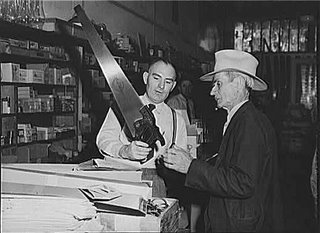October 26, 2006
15 Comments
 I was mildly discommoded yesterday. Twenty years ago, I would have been in a world of problems. SOL we used to call it. The reasons why I am back in the clover, more or less, instead of breaststroking through the septic, are poorly understood by the chattering classes. And by “poorly understood,” I’m being polite; I really mean: they haven’t the faintest clue about which they speak, and would destroy everything good about what I’m about to to tell you, while sumultaneously excacerbating all the problems attendant to it.
I was mildly discommoded yesterday. Twenty years ago, I would have been in a world of problems. SOL we used to call it. The reasons why I am back in the clover, more or less, instead of breaststroking through the septic, are poorly understood by the chattering classes. And by “poorly understood,” I’m being polite; I really mean: they haven’t the faintest clue about which they speak, and would destroy everything good about what I’m about to to tell you, while sumultaneously excacerbating all the problems attendant to it.
What happened? A very important tool broke, and at an inopportune time.
There really is no opportune time for this sort of thing, but when you’re working 12 hours a day or more every day trying to keep up already, calamities such as this can make a weak man look for a length of rope, an overhanging limb, and a chair. What the hell am I going to do?
The majority of all construction concerns, whether they be atelier furniture or condominiums you’re building, is logistics. You heard me. The skill part is way down the list.
How are you going to get the things you need, when you need them, and thereby make something that satisfies the logistical needs of others. The filigree is nice, but it ain’t important.
If you’re a framer for house construction, you have to know what you’re doing, cutting and nailing-wise, but it ain’t rocket science. How are you going to get a 35 pound sheet of plywood up on a half built roof using high school dropouts and non-english speaking persons is the rub. And how are you going to make sure that that sheet of cdx you need isn’t on the bottom of $40,000.00 worth of other lumber you ordered. How do you get it to the job on time, but no so early it gets stolen for the neighborhood kid’s treehouses before you even begin? Logistics, people. It’s all that matters.
As I was saying, the machine quit on me. A puff of smoke came out of it. Smoke signals in woodworking always translate the same: Don’t even plug that thing in again. The “blue screen of death” in woodworking actually involves death sometimes, so you don’t flirt with it.
I’ve been in this game a long time now. This used to happen in the field or factory, and you’d spend prodigious amounts of time, effort, and treasure trying to get another machine in place, or get the smoker fixed. You had no cellphone or computer; you’ d call from a landline, never getting the person you needed, trying to find the thing you wanted, driving around, and all the while your projects languished. You’d have to tell all your customers that the job was delayed, we’re waiting for such and such a part to come from (fill in the blank) and in the meantime we’re all sweeping the floor and sharpening our plane irons.
Someone in China wants to make this tool for me. Someone that can negotiate transnational contracts and shipping wants to broker a deal to make and ship the things. Somebody wants to drop enormous coin in advance to buy and distribute the item all over these here United States, so there will be a big stack of them everywhere. Somebody wants to go through all the hassles of finding, permitting, building, and maintaining enormous box stores all over the landscape so I the average Joe can get to the things they’re selling. Someone wants to drive a big truck all over the place day and night to deliver said items while we’re all sleeping. And some clerks want to stand there and scan the box when I finally get there. Don’t even get me started about all the information various parties wanted to supply me with on the internet, more or less free of charge, about the who, what, where, when, and how damn much it’s gonna cost.
That’s a lot of people who want to do things. I’m sure I’ve forgotten all sorts of people in there too, who are obscure but important to me. That’s understandable, because no one knows who’s important to them anymore. It’s just not knowable. And tinkering with the process whereby a willing seller hooks up with a willing buyer because you think you know better than everybody what everybody needs, is where the chattering class comes in.
They don’t think the guy in China needs that job. They don’t think the importer should be able to do that. They don’t think that truck should drive all night – or at all. They don’t think consumer goods need to be so cheap. They don’t think that warehouse should be built. They don’t think those clerks make enough money to bother working in that big box store. They don’t think… why am I bothering to list all this? They don’t think anybody needs anything they don’t need, and only if it’s offered in a format they understand and adheres to their cranky worldview.
Yes I do need it. Everybody in that endless concatenation of events and people need what we got, and what we especially don’t need is you mucking up our lives by saying we don’t know what we need.
I purchased a replacement for a tool I’ve been using –hard– for 15 years. The new one cost 1/2 of what the old one cost, and that’s not even adjusting for inflation. And it works better than the old one did, even when it was new.
I lost most of a day because of this. Twenty years ago I could have lost the better part of a week or more, and pulled out some of my hair in the bargain. And whoever sold me what I ultimately got would have performed the highway robbery pricing routine on me to boot.
Busybodies, get out of our way, we’re working here.






Recent Comments